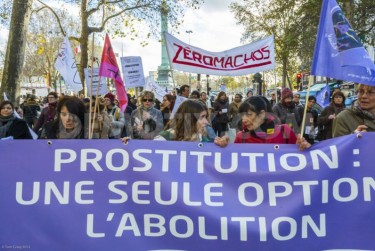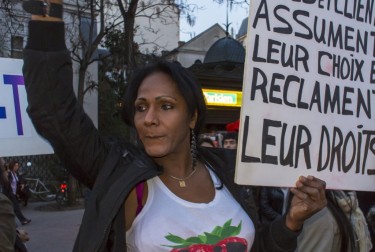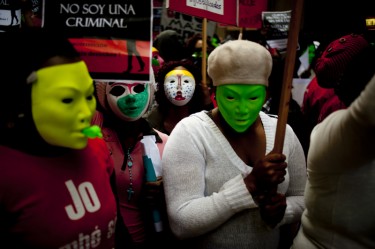[All links forward to english articles unless otherwise stated]
Two hundred NGO's from across Europe gathered at the European Parliament in Brussels on December 4, 2012. They called for the abolition of prostitution and presented outlines for a European policy to abolish prostitution. This event presented the first opportunity for such a debate to take place within the European Parliament. In fact, the European Parliament is currently developing a comprehensive evaluation report of European prostitution policies.

Various feminist groups marched against violence towards women in Paris, as part of an international event. Divergent opinions were expressed, some favorable, other adverse to the criminalisation of prostitutes and their clients. Photo Tom Craig copyright Demotix (25/11/2012)
For the abolitionists, prostitution criminalisation is the key to counter human trafficking for sexual exploitation. Grégoire Théry, general secretary of the Movement du Nid states on the Egalité website:
Regulation here means that it would make pimping legal. Regulating prostitution means in fact that we would allow someone to take advantage of other people prostituting themselves
In France, 90% of prostitutes are foreigners. The Minister for Women Rights Najat Vallaud-Belkacem introduced a bill to abolish prostitution and protect it's victims, following Sweden's lead on the matter. Its purpose is to “protect the vast majority of prostitutes who fell victims of violence from the networks of pimps.”
In the Netherlands, where prostitution is authorised and regulated, police estimates that 50% to 80% prostitutes are forced into the industry.
It is difficult to find reliable data on the number of prostitutes trafficked internationally. On one hand, accounting practices for these cases are different from one country to another; on the other hand the phenomenon is generally underground and victims avoid reporting crimes in fear of other reprisals. In Switzerland, according to the Federal Statistics Office, there were 147 complaints registered in the three years between 2009 and 2011 and only 66 people were convicted for human trafficking since 2000.
In France, 60 investigations have been open since 2004, and other cases have been prosecuted under different qualifications as slavery and procurement. Forty criminal networks were dismantled in 2011 in Paris, Caen, Bordeaux and Strasbourg and revealed victims were coming from Columbia, China, Ecuador, Nigeria, Romania and Brazil.

Transsexual Brazilian prostitutes manifested before the Chamber of Senate in Paris against the Anti-Prostitution Law, established by Nicolas Sarkozy in 2002. Photo de Tom Craig copyright Demotix (21/03/2012)
According to new information from the International Labour Office published in June 2012, 21 million people globally are victims of forced labour and human trafficking. Among them, 4.5 million are sexually exploited, mostly women and children, out of which 880,000 are recorded in the European Union. “Sometimes bought for only a few euros” it is reported they can lead to average annual earnings of €150,000in western states, the Scelles Foundation insists.
The Foundation highlights that human trafficking has a “worrying” evolution in Europe. The foundation's report published in December 2012 named, “Sexual Exploitation: prostitution and organised crime,” is an assessment of prostitution in 54 countries and its procurers that had set networks in an ” exemplary capitalist model”. The turnover of the sex industry is estimated to be over €1.5 billion in Greece (about 0.70% of GDP) and up to €18 billion in Spain where prostitution is permitted and regulated like any other job.
Voices in favour of abolition spoke out in the press and on social media platforms.
On December 18, 2012, Christine Le Doaré, a lawyer on her blog Total solidarity, feminism, and all that! commits herself to support abolition:
Aux clichés du libre choix et du moralisme abolitionniste, j’opposerais tout d’abord que de plus en plus de témoignages et d’études établissent qu’un grand nombre de personnes prostituées ont été victimes de violences sexuelles dans l’enfance. […] Se pourrait-il que les réglementaristes soient, à ce point, cyniques pour admettre que notre société n’a pas de proposition plus généreuse que la prostitution pour les aider à se reconstruire ? […] Les réglementaristes se sont-ils seulement posé la question de l’âge moyen d’espérance de vie d’une personne prostituée ? Une société ne doit-elle pas d’abord penser à protéger les personnes les plus vulnérables ? Les principes d’intégrité et de non marchandisation des corps humains ne constituent-ils pas des droits inaliénables qui doivent rester hors du commerce et des lois des marchés ? ».
To clichés of freedom of choice and abolitionist morale, I would oppose firstly the evidence from studies and testimonies that most prostitutes were victims of sexual abuse in their infancy. […] It might be possible that the pro-regulation are, at the moment, cynical to admit that our society has no other more generous proposal to help them rebuilt than prostitution? […] Did these regulationists even ask the question of the average life expectancy of a prostitute? Society shouldn't at first think about protecting the most vulnerable of its members? Are the principles of integrity and non-commercialisation of the human body are not inalienable rights that need to stay out of business and market laws?

Campaign of irate masked prostitutes in Barcelona, against the announcement of the Municipal Chamber of a possible amendment of the prostitution law. Photo Pau Barrena copyright Demotix (26/04/2012)
However all across Europe and the world, sex workers may they be French or foreigners, express their disagreement vis-a-vis the criminalisation of prostitution actors. With the support of feminist movements, they claim the right to self-determination and respect for human rights and call for the establishment of a proper status for their profession.
A joint letter by French intellectuals and feminists published in August declared that:
Chaque adulte doit être libre de ce qu'il veut faire ou ne pas faire de son corps. Décréter illégal ce qu'on trouve immoral n'est pas un grand pas vers le Bien, c'est une dérive despotique. Le pouvoir politique n'a pas à intervenir dans les pratiques sexuelles des adultes consentants. La priorité, c'est de faire de la lutte contre les trafiquants d'êtres humains une cause nationale et d'y mettre les moyens.
Every adult should be free to do what he wants or does not want to do with his own body. To declare unlawful what is immoral is not a big step towards the Good, it is a despotic drift. Political power does not intervene in the sexual practices of consenting adults. The priority is to make the fight against human traffickers a national priority and offer the means for this clash.
Here's a link to the second part of this post: Brazil Debates Human Trafficking for Sexual Exploitation.







9 comments